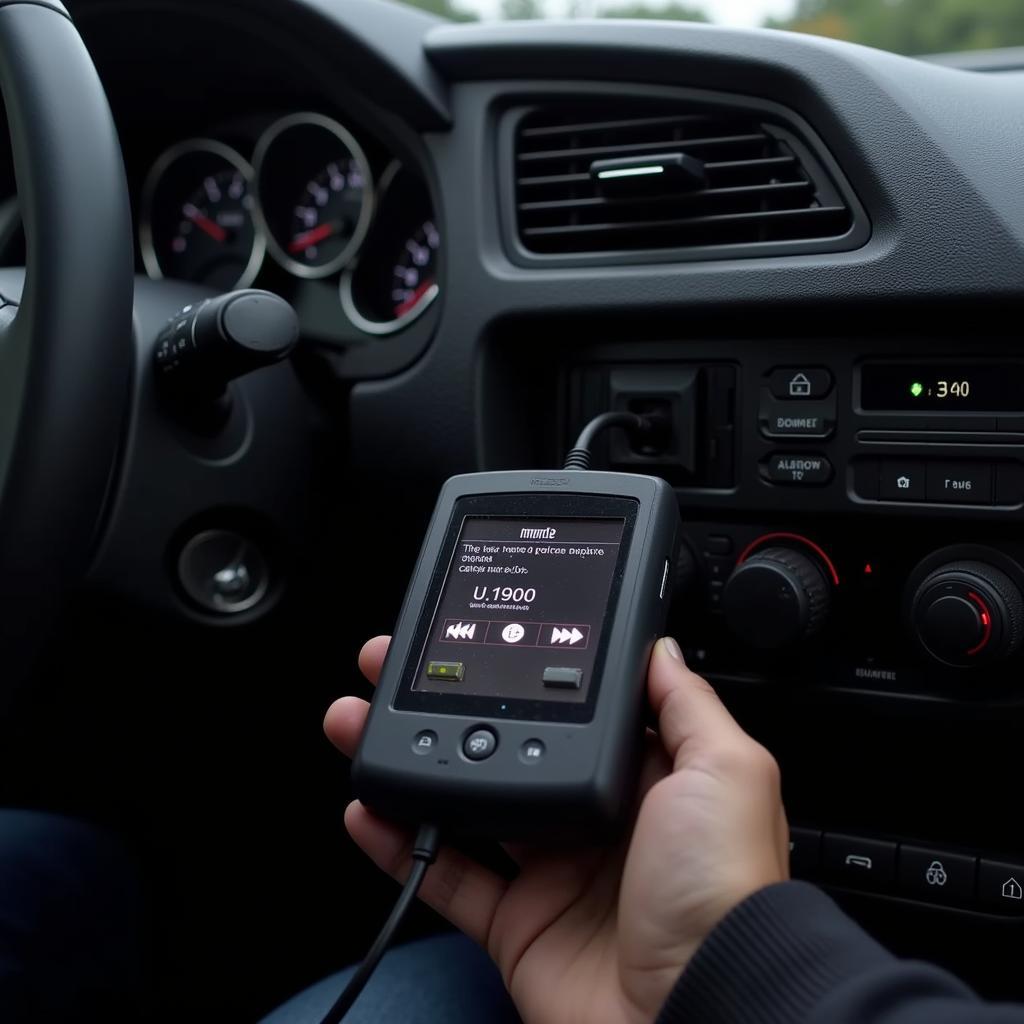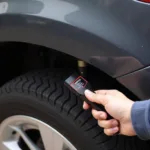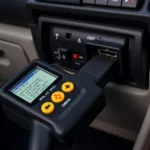The Mazda OBD2 code U1900 indicates a communication malfunction within your vehicle’s CAN (Controller Area Network) bus system. This system acts as the central nervous system of your Mazda, enabling various modules and computers to talk to each other and share critical data. When the U1900 code appears, it signals a breakdown in this communication, which can lead to a range of performance issues.
Understanding the CAN Bus System and the U1900 Code
Imagine your car’s CAN bus system as a busy network of highways connecting different cities (modules). Each city has its own function and relies on the highway system to exchange information and resources. The U1900 code suggests a disruption on these highways, hindering the smooth flow of data between these cities.
This disruption can manifest in various ways, from intermittent hiccups to complete communication blackouts. Depending on the severity and location of the fault, your Mazda might experience anything from minor inconveniences to major performance issues.
Common Symptoms of a U1900 Code in Mazda Vehicles
The symptoms associated with the U1900 code can be broad and often mimic other electrical faults. Here are some common signs that your Mazda might be experiencing a CAN bus communication error:
- Warning Lights: The check engine light is the most common indicator. However, you might also notice other warning lights on your dashboard, such as the ABS, traction control, or airbag lights.
- Engine Performance Issues: The U1900 code can lead to rough idling, stalling, reduced engine power, or even difficulty starting the engine.
- Transmission Problems: You might experience harsh shifting, slipping gears, or the transmission entering “limp mode.”
- Electrical Malfunctions: Issues with power windows, door locks, radio, or other electrical components might arise.
- Erratic Gauge Readings: The speedometer, tachometer, or fuel gauge may display incorrect or fluctuating readings.
What Causes the Mazda OBD2 Code U1900?
Several culprits can trigger the U1900 code in your Mazda. Identifying the root cause is crucial for an effective repair. Here are some common reasons:
- Wiring Problems: Damaged, corroded, or loose wiring within the CAN bus system is a frequent cause. This can be due to wear and tear, rodent damage, or improper repairs.
- Faulty Modules: A malfunctioning module connected to the CAN bus, such as the ECU, transmission control module, or ABS module, can disrupt communication.
- Weak Battery or Charging System: A weak battery or a failing alternator can lead to voltage fluctuations that interfere with the CAN bus signals.
- Aftermarket Installations: Improper installation of aftermarket accessories, especially those that interface with the vehicle’s electrical system, can cause communication errors.
Diagnosing and Fixing the Mazda U1900 Code
Fixing the U1900 code requires a systematic approach to pinpoint the underlying problem. Here’s how a professional mechanic would typically diagnose and repair this issue:
- Retrieve Diagnostic Trouble Codes: Using an OBD2 scanner, they’ll read the stored codes, including the U1900 and any other related codes, to get a clearer picture of the issue.
- Inspect Wiring and Connectors: A thorough visual inspection of the CAN bus wiring harness, connectors, and grounds for any signs of damage, corrosion, or looseness will be conducted.
- Check Battery and Charging System: The mechanic will test the battery voltage and alternator output to ensure the electrical system is functioning correctly.
- Test Individual Modules: Using advanced diagnostic tools, they can communicate with individual modules on the CAN bus to check their functionality and identify any faulty units.
- Repair or Replace Faulty Components: Based on the diagnosis, the mechanic will repair or replace any damaged wiring, connectors, modules, or other faulty components.
Preventing Future U1900 Codes
While some causes of the U1900 code, like component failure, are beyond your control, there are steps you can take to minimize the risk:
- Regular Maintenance: Adhere to your Mazda’s recommended maintenance schedule, including inspections of the wiring harness and electrical system.
- Careful Aftermarket Installations: If installing aftermarket accessories, ensure they are compatible with your Mazda’s electrical system and are installed correctly by a qualified technician.
- Promptly Address Electrical Issues: Don’t ignore warning lights or unusual electrical behavior. Address any issues promptly to prevent them from escalating into more significant problems.
Frequently Asked Questions About the Mazda U1900 Code
Q: Can I drive my Mazda with a U1900 code?
A: It’s not advisable to drive your Mazda with a U1900 code, especially if you experience drivability issues. The severity can vary, and continuing to drive could worsen the problem or lead to unsafe driving conditions.
Q: How much does it cost to fix the U1900 code?
A: The repair cost depends on the underlying cause. A simple wiring repair might be relatively inexpensive, while replacing a faulty module can be costly.
Q: Can I fix the U1900 code myself?
A: Diagnosing and repairing CAN bus issues can be complex and requires specialized knowledge and tools. It’s best to leave it to a qualified mechanic to ensure a proper diagnosis and repair.
Need Further Assistance?
Understanding and addressing the Mazda U1900 code can be daunting. If you’re experiencing this issue or have any questions, don’t hesitate to reach out to our team of experts. We’re here to provide you with the information and support you need to get your Mazda back on the road safely. Contact us via WhatsApp at +1(641)206-8880 or email us at [email protected]. Our dedicated customer support team is available 24/7 to assist you.


